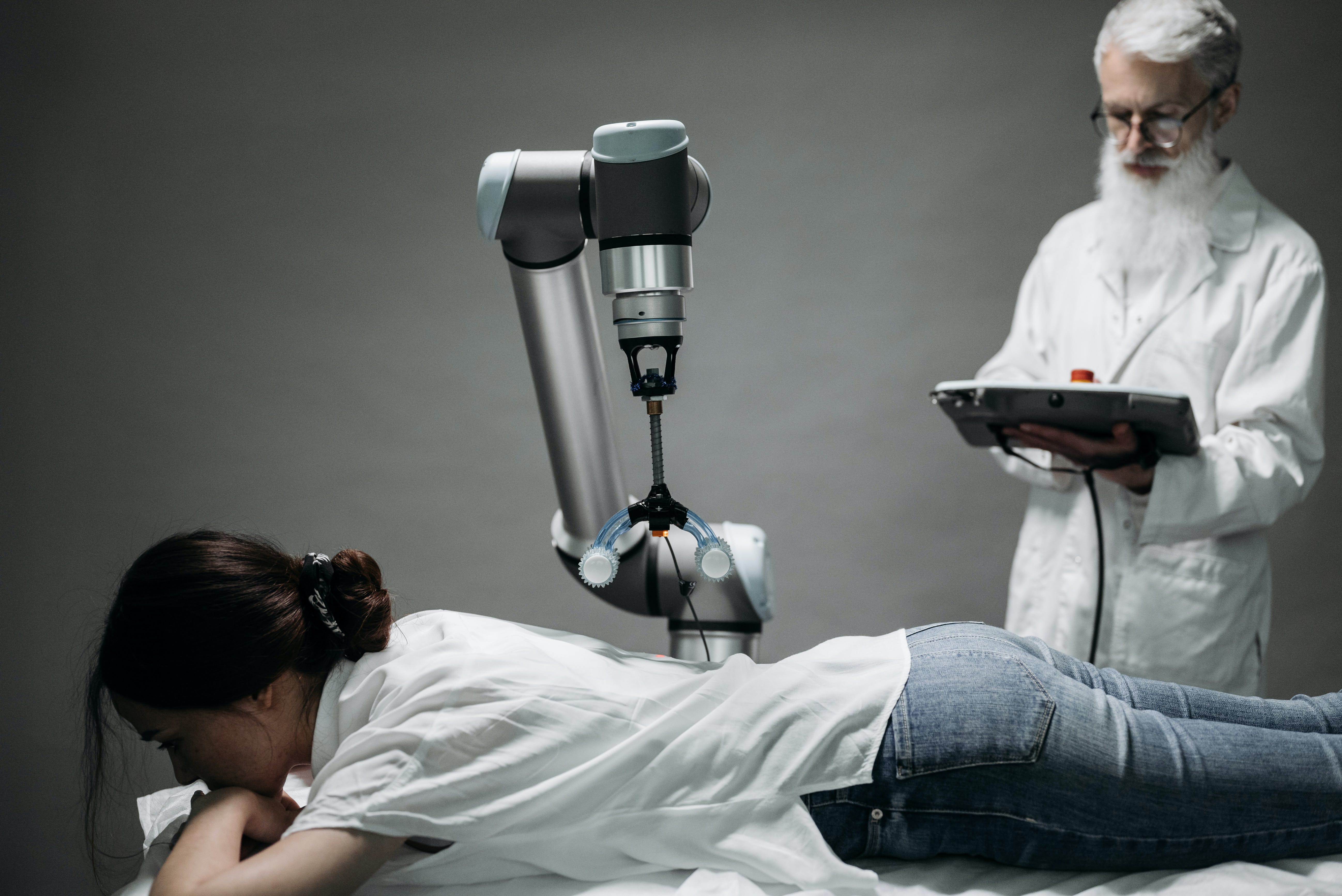Artificial Intelligence (AI) in healthcare is not just a buzzword; it’s a transformative force shaping the future of medicine. In this article, we’ll delve into the revolutionary impact of AI in disease diagnosis and drug discovery, exploring the intricacies, benefits, and challenges of integrating this cutting-edge technology into our healthcare system.
AI in Healthcare: A Paradigm Shift
From the moment you walk into a doctor’s office, the gears of the healthcare system are set into motion. But what if these gears could turn faster, more efficiently, and with greater accuracy? That’s precisely the promise AI holds in the realm of healthcare.
AI’s role in disease diagnosis and drug discovery is akin to having a supercharged ally in the fight against illness. It’s not about replacing human expertise but enhancing it to unprecedented levels. With AI for content recommendation playing a pivotal role, let’s explore how this technology is reshaping the landscape.
Disease Diagnosis: Beyond Traditional Boundaries
Traditional diagnostic methods have long been the backbone of healthcare, but they come with limitations—limitations that AI seeks to overcome. Imagine a scenario where a computer, armed with vast datasets and advanced algorithms, can analyze medical images, patient records, and genetic information in a fraction of the time it takes a human.
Unleashing the Power of AI in Diagnosis
The benefits of AI in disease diagnosis are tangible and game-changing. Take, for instance, the success story of PathAI, an AI-powered pathology platform. By leveraging machine learning algorithms, PathAI assists pathologists in accurately identifying diseases from pathology slides, significantly reducing diagnostic errors.
AI doesn’t just stop at pathology. In radiology, algorithms are proving to be adept at detecting anomalies in medical imaging, aiding in the early diagnosis of conditions like cancer. This isn’t about replacing the skilled eye of a radiologist but augmenting their capabilities.
Real-Life Impact: Saving Lives Through AI
Consider the case of a patient named Sarah, whose early-stage lung cancer was detected through an AI-assisted CT scan analysis. The timely identification allowed for prompt intervention, leading to successful treatment and recovery. Stories like Sarah’s underscore the real-life impact of AI in disease diagnosis.

Drug Discovery: Accelerating Innovation
The process of drug discovery is notoriously lengthy and costly. AI, however, is emerging as a catalyst for change, streamlining the identification of potential drug candidates and expediting the development process.
AI’s Contribution to Drug Discovery
In the intricate dance of molecules and pathways, AI is proving to be an invaluable partner. BenevolentAI, for instance, utilizes AI algorithms to sift through vast biomedical data, uncovering hidden connections and suggesting novel drug candidates. This not only expedites the discovery phase but also opens up avenues for drug repurposing, potentially saving years of research.
From Bench to Bedside: AI’s Impact on Patient Care
The benefits extend beyond the laboratory. With AI, the development of personalized medicine becomes a reality. Tailoring treatments to individual genetic profiles enhances efficacy and reduces adverse effects. The idea of a future where patients receive precisely targeted therapies based on their unique biological makeup is no longer a distant dream but a promising prospect.
AI for Content Recommendation: Guiding the Way
In the age of information overload, AI for content recommendation serves as a guiding light, helping both healthcare professionals and patients access relevant and timely information.
Navigating the Sea of Information
Consider the scenario where a medical researcher is looking for the latest studies on a specific drug class. AI algorithms, understanding the researcher’s preferences and the latest trends, can sift through an ocean of information, presenting the most pertinent studies for review. This not only saves time but also ensures that decisions are based on the most up-to-date and relevant data.
Patient Empowerment through AI
For patients, AI-driven content recommendation can be a powerful tool. Imagine receiving personalized health information, tailored to your medical history and preferences. Whether it’s understanding a diagnosis, learning about treatment options, or managing a chronic condition, AI ensures that the information reaching patients is not only accurate but also easily digestible.
Benefits and Challenges of AI: Navigating the Landscape
As with any technological revolution, the integration of AI into healthcare comes with its share of benefits and challenges.
The Upside: Transformative Benefits
- Efficiency Boost: AI streamlines processes, reducing the time taken for diagnosis and drug discovery.
- Precision Medicine: Tailoring treatments based on individual profiles enhances efficacy and minimizes side effects.
- Cost Savings: Faster diagnoses and streamlined drug discovery translate to significant cost savings for healthcare systems.
The Downside: Navigating Challenges
- Data Security Concerns: The use of vast datasets raises questions about patient privacy and data security.
- Ethical Dilemmas: Decisions made by AI algorithms may pose ethical challenges, especially in critical medical situations.
- Integration Hurdles: Adapting existing healthcare systems to incorporate AI seamlessly presents logistical challenges.
The Future: Envisioning a Healthier Tomorrow
As we stand at the cusp of a healthcare revolution, the future holds promises of even more remarkable advancements.
Beyond the Horizon: Future Trends
- AI-Integrated Clinics: Imagine clinics where AI assists healthcare professionals in real-time, providing insights during patient consultations.
- Genomic AI: The convergence of AI and genomics could unlock unprecedented insights into individualized treatment strategies.
- Global Collaboration: A future where AI facilitates global collaboration, enabling rapid response to health crises.
A Call to Action: Embracing the AI Revolution
The road ahead is exciting, but it requires a collective effort. As we navigate the intricate intersections of technology, medicine, and ethics, the key is to embrace the AI revolution responsibly. It’s not about replacing human touch but enhancing it with the precision and efficiency only AI can offer.
Conclusion: The Tapestry of Tomorrow
In conclusion, the integration of AI in disease diagnosis and drug discovery is not just a technological leap; it’s a leap toward a healthier, more personalized future. From saving lives through early detection to revolutionizing the drug development process, AI’s impact is profound and far-reaching.
As we step into this new era of healthcare, guided by the algorithms of progress, let’s remember that behind every line of code and every algorithm is the potential to transform lives. The AI revolution in healthcare is not just about machines; it’s about people—patients, doctors, researchers—working together to rewrite the narrative of healthcare for generations to come.


Oh my goodness! Amazing article dude! Many thanks, However I am encountering problems with your RSS.
I don’t understand why I cannot subscribe to it. Is there anyone else getting the same RSS issues?
Anyone who knows the answer will you kindly respond?
Thanks!!
My site :: vpn coupon code 2024
Appreciate this post. Will try it out.
Also visit my page :: vpn special coupon code 2024
Write more, thats all I have to say. Literally, it seems as though
you relied on the video to make your point. You definitely know what youre talking about, why waste your intelligence on just posting videos
to your blog when you could be giving us something enlightening
facebook vs eharmony to find love online read?
Great blog here! Also your site loads up very fast!
What host are you using? Can I get your affiliate link to your host?
I wish my site loaded up as quickly as yours lol
Review my site nordvpn special coupon code 2024